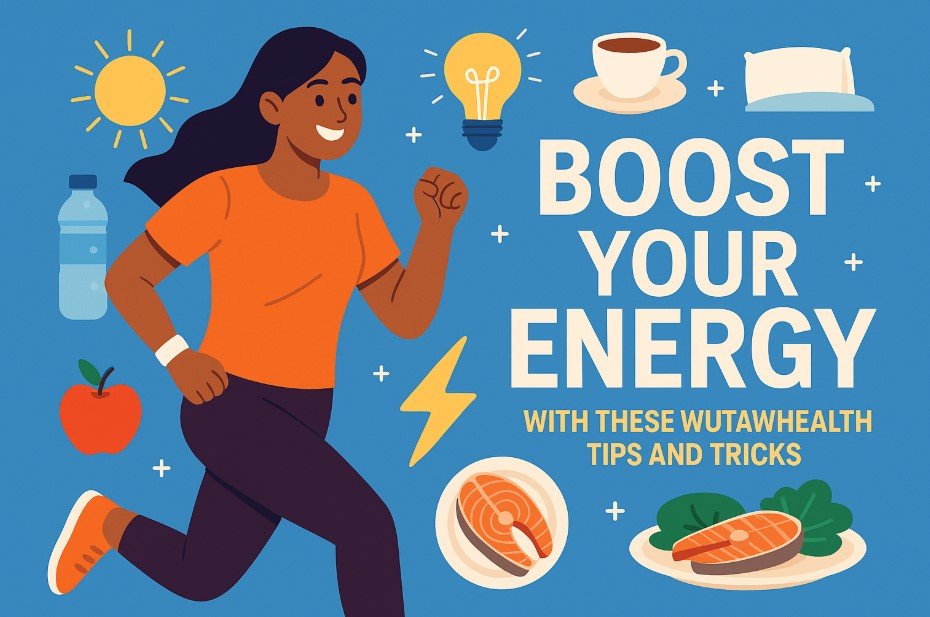
Feeling low on energy can affect productivity, focus, and overall quality of life. Many people struggle with fatigue during the day and look for simple ways to stay active and alert. WutawHealth focuses on practical lifestyle strategies that support physical and mental well-being. By following these tips and tricks, it is possible to build daily routines that promote higher energy levels and reduce tiredness. These methods are based on balanced nutrition, physical activity, quality sleep, hydration, and stress control. Together, they form a complete plan to support energy throughout the day.
Start the Day with a Nutritious Breakfast
Breakfast is often considered an important meal because it provides the body with fuel after hours of sleep. A balanced breakfast should include complex carbohydrates, protein, and healthy fats. Complex carbohydrates such as whole-grain bread, oats, or fruits release energy slowly, which helps maintain steady energy levels. Protein from eggs, yogurt, or nuts supports muscle health and keeps hunger away for longer. Healthy fats from sources like seeds or avocado help provide lasting energy. Avoid skipping breakfast, as this can lead to low blood sugar and early fatigue. Preparing a simple, balanced meal in the morning sets a strong foundation for the rest of the day.
Stay Hydrated Throughout the Day
Dehydration is a common cause of fatigue that many people overlook. Even mild dehydration can lower concentration and energy levels. Drinking water regularly is an easy way to stay energized. Most people should aim for about eight glasses of water each day, though individual needs can vary depending on activity level and climate. Herbal teas, fresh fruits, and vegetables also contribute to daily hydration. Try to drink a glass of water as soon as you wake up, and keep water nearby while working or exercising. Limiting sugary drinks and excessive caffeine helps prevent energy crashes later in the day.
Include Regular Physical Activity
Physical activity improves blood circulation, delivers more oxygen to the body, and helps maintain energy. Exercise does not need to be intense or time-consuming to be effective. Even short sessions of walking, stretching, or light workouts can improve alertness and reduce fatigue. WutawHealth suggests at least 30 minutes of moderate activity on most days of the week. Activities like brisk walking, cycling, swimming, or yoga are all helpful. Movement during work hours, such as standing or walking breaks, can also reduce tiredness caused by long periods of sitting. Over time, consistent activity strengthens muscles and improves stamina, which supports overall energy levels.
Eat Balanced Meals and Healthy Snacks
What you eat during the day affects how much energy you have. Large, heavy meals can make you feel tired, while balanced, moderate meals provide steady energy. Include a mix of complex carbohydrates, lean protein, and healthy fats in every meal. Foods such as whole grains, legumes, vegetables, fruits, lean meats, fish, nuts, and seeds are good options. Avoid processed foods and high-sugar snacks, which can cause quick energy spikes followed by crashes. Healthy snacks between meals, such as fruit with yogurt or a handful of nuts, can help maintain energy without overeating. Eating at regular times also supports stable energy levels.
Get Enough Quality Sleep
Sleep is one of the most important factors for energy. Most adults need about seven to nine hours of sleep each night to feel fully rested. Poor sleep quality can lead to constant tiredness, difficulty focusing, and lower physical performance. To improve sleep, try going to bed and waking up at the same time every day, even on weekends. Avoid heavy meals, caffeine, and screen time close to bedtime. Keep the bedroom cool, dark, and quiet to promote better rest. If you have ongoing sleep problems, it may help to speak with a healthcare provider. Quality sleep gives the body time to recover and restore energy.
Manage Stress Levels
High stress uses up mental and physical energy quickly. Learning to manage stress can improve daily energy and overall well-being. Relaxation methods such as deep breathing, meditation, or gentle stretching can help lower stress levels. Taking short breaks during work, practicing time management, and setting realistic goals also reduce pressure. Staying connected with supportive friends or family can improve mood and reduce feelings of exhaustion. When stress is under control, the body uses energy more efficiently, and tiredness is less likely to build up throughout the day.
Limit Excessive Caffeine Intake
Caffeine can give a short-term boost in alertness, but too much can lead to energy crashes later. Many people rely on several cups of coffee or energy drinks to get through the day, but this can disrupt sleep and cause fatigue the next day. A moderate amount, such as one to two cups of coffee or tea in the morning, is usually fine for most adults. It is best to avoid caffeine in the afternoon or evening, as it can interfere with falling asleep. Gradually reducing caffeine intake can help prevent withdrawal symptoms like headaches or irritability. Choosing herbal teas or water instead of sugary caffeinated drinks also helps maintain steady energy.
Take Short Breaks During the Day
Working for long hours without breaks can drain energy and reduce concentration. Taking short breaks throughout the day helps refresh the mind and body. A break can be as simple as standing up, stretching, or walking for a few minutes. These small movements improve blood flow and prevent muscle stiffness from long periods of sitting. WutawHealth recommends a five-minute break every hour when doing desk work. Going outside for fresh air during lunch breaks can also boost energy and mood. Regular breaks prevent mental fatigue from building up and help maintain steady focus and productivity.
Organize Your Daily Schedule
Poor time management can lead to stress and tiredness. Organizing daily tasks can help save energy and reduce feelings of being overwhelmed. Start the day by listing the most important tasks and complete them first when energy is highest. Break large tasks into smaller, manageable steps. Avoid multitasking, as switching between tasks can use up more energy and lower efficiency. Setting realistic goals and allowing time for rest in between tasks can also help. A well-planned schedule supports balanced energy use throughout the day and prevents mental burnout.
Maintain Healthy Body Weight
Carrying excess weight can increase tiredness because it puts extra strain on the body during daily activities. On the other hand, being underweight can cause low energy because the body may not have enough stored nutrients. Maintaining a healthy weight through balanced eating and regular physical activity can support energy levels. It can also reduce the risk of conditions such as sleep apnea, which can affect sleep quality and lead to daytime fatigue. If weight management is challenging, consulting a healthcare professional or nutritionist can provide guidance and personalized strategies.
Spend Time Outdoors
Spending time outside can naturally increase energy. Natural light helps regulate the body’s internal clock and supports better sleep patterns. Exposure to sunlight can also improve vitamin D levels, which are important for maintaining energy and mood. A short walk in the morning or during lunch breaks can provide these benefits. Outdoor activities such as gardening, hiking, or cycling combine light exposure with physical activity, giving an added boost. Making outdoor time part of the daily routine can support both physical and mental energy.
Listen to Your Body
Everyone’s energy patterns are different. Some people feel most energetic in the morning, while others have more energy in the afternoon. Paying attention to personal energy peaks can help plan activities more effectively. Try to schedule demanding tasks during high-energy times and lighter tasks during low-energy times. It is also important to rest when feeling very tired. Ignoring signs of exhaustion can make fatigue worse over time. Regularly checking how your body feels can help you adjust your habits and maintain steady energy throughout the day.
Conclusion
Boosting energy requires a balanced approach that includes healthy eating, enough sleep, regular activity, stress control, and good daily habits. Simple steps like eating nutritious meals, staying hydrated, exercising moderately, and getting quality sleep can make a noticeable difference in daily energy levels. Managing stress, limiting caffeine, and taking short breaks during work also help maintain focus and reduce fatigue. Spending time outdoors, organizing tasks effectively, and listening to your body’s signals are equally important. By following these practical WutawHealth tips and tricks, it is possible to improve energy naturally and stay active throughout the day. Building these habits gradually can support long-term physical and mental well-being.
Read more: 10 Simple Nutrition Tips for Beginners












